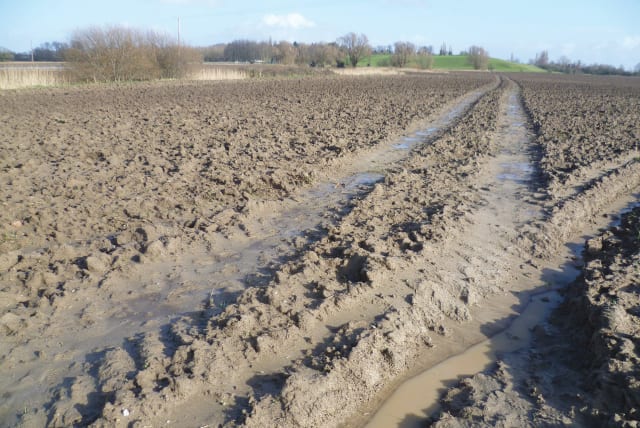A midrash, a miracle and some mud

What lessons does the biblical miracle of the parting of the Red Sea in Exodus, commemorated on Passover, have for modern Israel amid domestic turmoil?
In Jewish tradition, the seventh day of Passover commemorates the miracle at the Red Sea, when God saved the Jewish people from the advancing Egyptian army by splitting the waters to enable them to escape their pursuers.
As we prepare to celebrate this momentous historical event on the last day of the festival, modern Israel could not find itself at a more challenging crossroads. The country is beset by domestic strife and disagreement, with both the volume and tone of the internal debate hitting unprecedented levels. And on the international front, we are surrounded by energetic external enemies bent on our destruction, chief among them the tyrants in Tehran.
Like our ancestors of old, we are seemingly left with few options, stuck in a perilous situation with no obvious egress in sight.
But the Torah is not only about Jewish history; it is about Jewish destiny. And it speaks to us directly down through the generations, if only we know how to listen and hear its call.
Learning lessons from the parting of the Red Sea for modern Israel
Indeed, the events at the Red Sea contain within them some valuable lessons for modern Israel, particularly when viewed through the prism of the midrashic literature, which is one of the richest sources of rabbinic exegesis.
Covering everything from law to lore, the midrashic texts offer a penetrating look at some of the oldest questions known to man. Although they were written thousands of years ago, their insight and instruction remain fresh and relevant.
TAKE, FOR example, the midrash in Exodus Rabbah (24:1), which cites a verse from Psalms (106:7) in which King David describes the departure of the Jews from Egypt and adds an additional detail about their behavior, saying, “they were rebellious at the sea, at the Red Sea.”
The midrash is bothered by the seemingly repetitive language of the verse – “at the sea, at the Red Sea” – and explains that this indicates that the Jews rebelled there twice, even though this is not apparent from a simple reading of the biblical account in Exodus.
The first act of rebellion, says the midrash, was the Jewish people’s initial refusal to plunge into the water as God had told them to do. It was not until the tribe of Judah, led by their prince, Nachshon ben Aminadav, had bravely gone in, that the waters parted and the Jews were able to cross the Red Sea to safety.
In other words, deliverance required a daring act of faith, a willingness literally to dive into the problem and confront it, confident in the justness of our cause.
The second act of rebellion, according to the midrash, was that once God had split the sea and the Jews were able to walk across, they found it muddy and began to complain, for the seabed was still wet from the water that had been there prior to the miracle.
The midrash recounts that one Jew would say to another as they crossed: “Mud in Egypt, now mud at the sea. Mud and bricks in Egypt, and now the mud of many waters at the sea.”
This midrash is simply fascinating, for it demonstrates that human nature has not really changed very much over the past 3,000 or so years.
Imagine the scene: After witnessing the 10 plagues that befell the Egyptians, the Jews have been liberated from their taskmasters and marched out of Egypt as a free people. And then God miraculously splits the Red Sea to save them. Yet at the height of the miracle, with the sea standing like a wall to their left and their right, the Jews find nothing better to do than to complain about the mud on their shoes. How petty it seems, how undignified!!
And yet, truth be told, don’t we share a bit of the same attitude? Miracles are all around us, yet we, too, have a tendency to focus on the mud.
The ingathering of the exiles from Russia, Ukraine and Ethiopia, the rebirth of Jewish communities in the historical heartland of Israel, the flowering of Torah and Jewish tradition, the resurrection of the Hebrew language, the dynamism of Israel’s economy – all of these are logic-defying wonders that should captivate the imagination.
Sure, daily life in the Jewish state has its frustrations, tensions and even absurdities. And the situation can often be muddied, whether by the media or by our leadership.
But in the scheme of things, when one takes a step back and looks at the course of Jewish history over the millennia, it is clear that we are living in special times, regardless of whatever setbacks we might encounter as a people.
Taken together, the two lessons of the midrash speak directly to our times. When faced with a potential onslaught by a hostile foreign foe, be it Pharaoh’s army or the ayatollahs, there is no room for hesitation or delay. Only decisive and determined action will do.
And as for our domestic troubles, we would do best to recall that when you are in the middle of crossing the Red Sea, the key is not to look down at your shoes, but forward to your destination.
Don’t focus on the mud. Look around you, and you will be reminded of a basic and important truth: We are all, each and every one of us, enveloped by miracles.
The writer served as deputy communications director under Prime Minister Benjamin Netanyahu during his first term of office.■
Jerusalem Post Store
`; document.getElementById("linkPremium").innerHTML = cont; var divWithLink = document.getElementById("premium-link"); if (divWithLink !== null && divWithLink !== 'undefined') { divWithLink.style.border = "solid 1px #cb0f3e"; divWithLink.style.textAlign = "center"; divWithLink.style.marginBottom = "15px"; divWithLink.style.marginTop = "15px"; divWithLink.style.width = "100%"; divWithLink.style.backgroundColor = "#122952"; divWithLink.style.color = "#ffffff"; divWithLink.style.lineHeight = "1.5"; } } (function (v, i) { });

